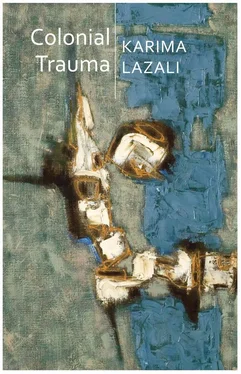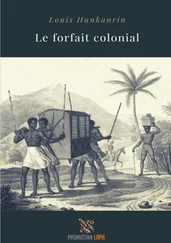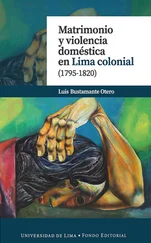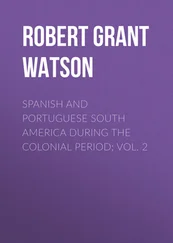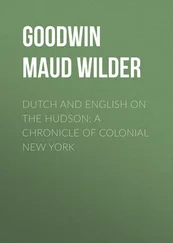Probably not, if one considers that the blind spot in the psychological literature signals a larger problem: the longtime silence of leading public officials on colonial violence and its persistence today in a number of disciplines, especially in the clinical and social sciences. The logic of colonialism lives on in the thoughts, speech, and practices of former colonizers and those once deemed “ indigènes .” This logic defies treatment, in the medical sense of this term: it doesn’t respond to care or examination. This holds true regardless of the subject’s place within colonialism (colonizer or colonized). The matter is clearly expressed through the blank spaces found in writing from both sides of the Mediterranean. This poses a serious challenge to clinical studies, which would like to establish a set of clear issues and carefully trace them back – following visible signs – to the matter of colonial violence. No such signs exist in this case. This blank space has risen to a deafening pitch in French and Algerian society, where it can be felt by all. For the clinical psychologist, the legacy of colonialism exposes an unusual psychic phenomenon, namely, the existence of a whole field of invisible traces that, in spite of their seeming absence, give shape to subjectivities and political discourse. The clinical psychologist is forced to deal with a history deprived of archives, literally and metaphorically. It is now no longer a question of deconstruction, but one of reconstructing traces that exist outside of memory.
A much-needed interdisciplinary approach
For the time being, uncovering this history is left to historians, whose work, although indispensable, fails to account for actively troubled subjectivities. What’s more, in France, once a historical record is reconstructed, it rarely gets noticed outside of its own disciplinary framework. This is in stark contrast to the multidisciplinary approach of postcolonial studies in the Anglophone world, which have remained largely inaccessible to Francophone readers, in spite of the fact that these works draw on the writing of major French-language theorists: Césaire, Sartre, Fanon, Memmi, Lacan, Derrida, Foucault. Further developed and articulated abroad, this French history is paradoxically hard to translate back home. This paradox seems symptomatic of an impossible reciprocity, which results in so much research, so many carefully crafted arguments remaining in utter obscurity.
In France, there seems to be an assumption that the history of colonization falls strictly within the purview of historians and former “ indigènes ,” and therefore that they have the exclusive right to treat it. And in Algeria, that colonialism belongs entirely to those who were colonized, making the rest of us apathetic to its debates and complex history. Go along now, nothing to see here! In both places, there are unbridgeable divisions – an effect of coloniality. And this issue cannot be tackled without an interdisciplinary approach, as each discipline offers a distinct vantage point on the matter. Otherwise, by succumbing to a crude partitioning of the past, present, and future, the colonial world will continue to remain sealed and inaccessible.
In Algeria, the effects of colonialism are so embedded in the psyche of individuals that it becomes difficult to distinguish between what results from direct impact and what has formed over time into an “identity” crisis caused by its disruption of the core network of subjectivities and the social bond. Subjectivities are thus entirely suffused with coloniality. This is now accepted as an unequivocal and indisputable historical fact, which undermines the idea that the primary interpreter of History is first and foremost the subject. This is probably why the consequences of colonization appear only in public discourse as cries of pain and resentment, which target the Other of colonialism while staying mute about the impacts of History on one’s personal history. In Algeria, it is as though colonization is the one and only trauma . Whereas in France, the notion of colonial trauma is flipped on its head and exploited by the political order: much talk is made of the “benefits of colonization” for “ indigène ” subjects. The political order thus strives to make the historical record disappear and to discount the role the subject plays in History. Here again, no clinical work has considered the specificity of these traumas and their impact on the social bond. Instead, we are stuck in the hell of this duality which allows the war to persist by other means.
Bringing together psychoanalysis, history, and literature in an attempt to discern the invisible role played by politics, this book’s approach may be judged problematic from within the specialized fields of each of these disciplines. But I can think of no better way of treating the politico-subjective “matter” of coloniality in Algeria, a totality that cannot be contained by isolated disciplines. Specialists from these fields each see themselves as the best positioned to take on the wide-scale devastation of this affair. But the coalition formed in this book with these three disciplines creates a dynamic approach where each discipline informs and alters the other, the cumulative effect of which, I hope, will not be lost on any reader. This transdisciplinary configuration is also a way of mounting a defense against the blanket-statement generalities and deadly binary logic that affect anyone who has tried to take a closer look at colonialism.
Literature strives to give expression to the blank spaces and the ideological blind spots present in the historical record. Above all, it alerts the reader to how a text is continuously shaped by its invisible margins. The psychoanalyst, for her part, works to read and analyze what can be read without reading. This works only insofar as the psychologization of characters and writers can be carefully avoided. It is a matter of treating the literary text as a literal object. This is clearly at odds with most approaches to literature, in the same way that my subjective approach to history stands in contrast to the historian’s objective approach. The other challenge this approach encounters is its use of psychoanalysis as a tool for understanding the political dimension of history and society. One must strive to avoid psychologizing society and/or “sociologizing” the subject. Although, as Freud says, no boundary separates the individual from the community, it remains a challenge for the psychoanalyst, whose practice is based on individual experience, to understand the community through the individual and vice versa.
Putting psychoanalysis, history, and literature to use in this way brings us the closest to what has been, and continues to be, erased by the political order, whose subjects are kept in the darkness of a sleepless and endless night. History seizes, literature writes, and psychoanalysis reads what resides in the blank space of the text’s margins.
1 1 Frantz Fanon, “Psychiatric Writings,” in Alienation and Freedom, eds. Jean Khalfa and Robert Young, trans. Steven Corcoran (London: Bloombsury, 2018), pp. 167–530.
1 Psychoanalysis and Algerian Paradoxes
I’m asking God, who, by the way, no longer believes in me, for forgiveness.
Sarah Haider, 2013 1
One can get over the disappearance of the past.
But we cannot recover from the disappearance of the future.
Amin Maalouf, 2012 2
Caught in a continual tension between servitude and freedom, Algerian society is a mix of contradictions. Since 1962, it has seen progress in a variety of areas: schooling for children; treatment of women, who are much more visible now in public spaces; access to free healthcare, and so on. On top of all this remains an unfulfilled desire to regain a sense of belonging after the colonial order has laid waste to one’s ties to the past (destroying languages, traditions, communities). Despite this progress, pain is still constantly felt and expressed by individual subjects, regardless of their sex, language, profession, or cultural belonging. This pain, expressed by numerous patients during the course of my psychoanalytic practice in Algeria, is rarely viewed as part of a larger historical and political context. Individuals feel as though they are gasping for air, suffocating, being crushed under an unbearable weight. A sense of inertia is palpable and conveys the feeling of a “foreclosed” future.
Читать дальше
